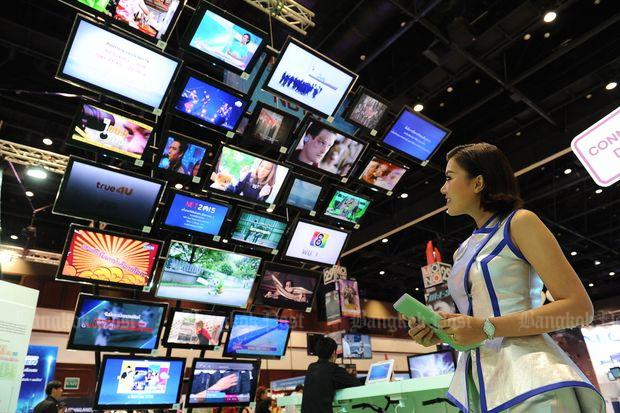
The 15 remaining digital TV channels will face a new set of challenges from innovative technology like artificial intelligence (AI), 5G, augmented reality (AR) and virtual reality (VR) that will further disrupt their traditional business model.
TV operators have to focus more on creating original content, while strengthening the status of authoritative media or trustable content, according to a seminar on Thursday titled "Problems and Exits in Digital TV" held by Chulalongkorn University.
In related news, a subcommittee of the broadcasting regulator passed a resolution on Thursday ordering the seven digital TV operators that will exit the business to submit compensation benefits for their employees which at least meet those required by labour regulations.
The plan for compensation benefits must be submitted to the National Broadcasting and Telecommunications Commission (NBTC) by July 10, or 60 days from May 10, together with related documents such as details and a timeline of airing programmes before the channels shut down.
The move is to minimise the burden on employees and their families who will be affected by the channels shutting down.
Supot Tiarawut, a telecom veteran and chief transformation officer at Chulalongkorn University, said the government has invoked Section 44 to ease the financial burden of existing digital TV operators three times since 2016.
But digital TV operators will face even more challenges from innovative tech like AI, 5G and AR/VR.
Changing consumer behaviour in viewing video content on YouTube, Facebook and Netflix has eaten away at revenue from traditional TV channels that rely on advertising.
Mr Supot said AI will help corporations spend smarter on their advertising budgets, matching demand, which means traditional TV channels will see less advertising money in the future.
5G or enhanced mobile broadband networks will widen the variety of channels and opportunities for consumers to easily access video content.
Mr Supot allowed that some digital TV channels have transformed operations through digital innovation to cope with the changing business environment, such as investing in virtual studios or airing programmes via omni-channel, but it seems it will not be enough to compete with internet platforms.
"The core asset of the media from now on is to provide more original quality content and become an authoritative media which is trustworthy," he said.
Mr Supot said the regulator should seek a way to reduce some of the fixed costs of operations for TV channels as another way to encourage TV channels to produce more original content.
The government should also promote tech startups in the digital media platform business, he said.
Peerawat Chotithammo, president of the Thai Broadcast Journalists Association, said TV licence fees, broadcasting network rental fees and the must-carry rule are fixed costs for each channel, making up over 30% of total operating costs.
Mr Peerawat said TV operators always cut costs in content and manpower first when faced with financial burdens, so this remains a major obstacle for generating original quality content amid a difficult business environment.